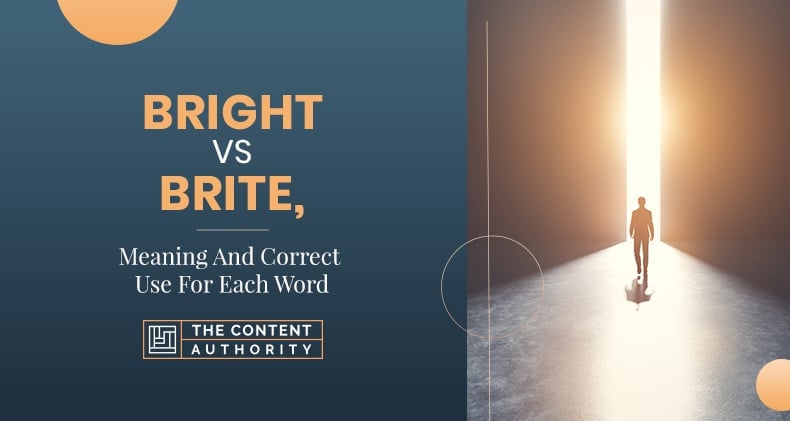Imagine you start the day; when you walk outside, the sun pleasantly hits your face. You message your friend: it will be a bright day today. Or is it a brite day?
“Bright” is the term for something visually clear, radiant, and evident. Something vivid and colorful. Additionally, it also refers to quick intellect, being intelligent or happy. On the other hand, “brite” does not exist in the English language. As a product name, it is substituted for “bright.”
English dictionaries often describe “bright” as radiating, lively, cheerful, reflecting light, or something that shows promise for the future. In contrast, “brite” is not supposed to be used in any other element that isn’t a way to say bright in a commercial product’s name. “Brite” means shiny in advertising slang.
The word “brite” is also famous in crosswords. If you look to complete characters, cartoon names from favorite tv shows, toys, or a renowned cleaning device, the most recognized use of the words is Scotch- Brite.
According to Webster’s dictionary, the definition of “brite” is when wheat, barley, or fruit becomes overripe. This is the only definition found for “brite” in a dictionary. A British man has been referred to as “brite” or “briten” for two or more British men.
Does The Word Bright Have An Origin?

“Bright” is an adjective derived from Middle English. The word evolved to be written in the same way it is today and meant giving off much light, color, intense, shining, glorious, and beautiful.
As symbolic speech, the word “bright” also means free from sin and enlightened. In Old English, the word used to be written as “bryht” and “breht.” Similar to the Old German word “berth” that was defined as: to shine, or simply white. The Germanic word was also a commonly used source for name-giving.
The etymology of names like Robert, Albert, Bertha, Gilbert, Hubert, and Lambert, show a relationship with the Germanic word “berth.” In modern German, it is still part of names like Albrecht and Ruprecht. “Berth” is no longer used.
There is currently no record of when “bright” became synonymous with happiness, but we can be sure that it has been a long time since those words have been associated with each other. The word “brite” as a variant of “bright” has been in existence since the 19th century. It derives from the sound you sometimes make while saying the term “bright.”
In advertisement, “brite” dates back to 1905 when the ads for “Star-Brite Metal Polish” of a company named Star-Brite Company of Lancaster were made public. Both words are also the name of recurring programs, a social and a science one. There is a movement called “The Brights” and a space experiment called BRITE.
What Is The Canadian Brite?
The Bright Star Target Explorer, best known as BRITE, is the Canadian Advanced Nanospace Experiment 3. A constellation of six nano satellites operated by universities hailing from Canada, Austria, and Poland.
Any satellite that weighs under 10kg is considered a nanosatellite. These petit satellites are compatible and can be merged to form bigger satellites.
The Canadian Broadcasting Corporation and its leading science journalist at the time, Bob McDonald, considered BRITE Constellations to be one of the most important science histories of 2013. BRITE nanosatellites were designed in Aerospace Studies at the University of Toronto, Canada. They are cube-shaped.
The mission of the Bright Star Target Explorer is to measure the light of the brightest star in a continuous range.
Satellites in Toronto and Poland are sensitive to red lights. In contrast, the satellites in Montreal and Austria are sensitive to blue lights.
The name for the BRITE experiment refers to brightness. They are looking for a way to measure how much light reflects from the stars.
What Are The Brights?

The Brights is a social movement with 18 years in existence. Its members call themselves “Brights,” and their view of the world comes from philosophical naturalism.
Philosophical naturalism is the idea that only natural forces are the ones in control of the universe. People who follow this belief understand that natural laws are the only rules that govern the world.
Paul Geisert, a biology teacher from Chicago, is a co-founder of The Brights. Originally, he came up with the name for the movement after attending a march called “Godless Americans March” in Washington. He believed the word “godless” would gather more enemies than followers.
Geisert then came up with the name The Brights as a positive word for those who do not believe in supernatural powers.
Many members of this movement identify themselves as atheists, antitheists, humanists, agnostics, skeptics, and freethinkers. The movement is not associated with any belief.
The Brights Have Proposed Different Terminologies For Some Words:
Super, for someone who believes in supernaturals or mystical powers.
“Bright,” for someone whose viewpoint is naturalistic and who does not believe in supernatural or mystical forces. Additionally, this noun may refer to someone who has registered as a member of the movement through their website.
The movement also utilizes the word “bright” to indicate intellect or intelligence.
Other Word Usage Posts
How Do We Use The Word Bright In Sentences?

We can acknowledge that “bright” means radiating light, happiness, and intelligence—three very different things. Let’s see how they can be used.
Examples
Sundays are usually bright days—the perfect time for a trip to the beach.
Back in the day, we could run up and down the street all day, every day. Those are bright moments that rarely come back.
Little Timmy got high scores in his homework. He is beginning to grow into a bright young man.
What Are Some Synonyms For Bright?
We already covered happiness, light, and intellect. The word “bright” has many more terms that could fully express the same meaning. Expressions like brilliant, radiant, and dazzling are some of them.
Brilliant is defined as very bright—something distinguished, and for the British, something that is excellent.
For example, “Rose cooked a brilliant dish last night.” The term “brilliant dish” could refer to either a colorful dish or a delicious dish.
The word radiant means reflecting beams of light or shining. Example: The sea is radiant this time of day.
The last term is dazzling, meaning very bright or impressive. Example: The last show at the theater was dazzling.
Antonyms Of The Word Bright.
Often referred to as the opposite of “bright” is dim, dull, or lackluster.
The definition of dim is emitting or having a small amount of light. Lacking quality. Example: I wouldn’t say I liked the hotel. It had a dim and scary hallway.
The word dull means something or someone is tedious or uninteresting. Something that is not resonant. Example: My date last night wasn’t fun. It was full of dull moments.
Lackluster is an adjective that refers to lacking vitality. Mediocre. Example: The halftime show this year had plenty of lackluster performances.
Conclusion
Between “bright” and “brite”, the only accurate word is “bright”. The only definition of “brite” comes from Webster’s dictionary, and people do not use it as such.
“Brite” is only known as short for a brand or a character name. When people use “brite” in real life, they are referring to a cleaning device.
The proper use is always the word “bright.” For “becoming overripe,” we have been using decadent, decay, or washed up for a long time.
Shawn Manaher is the founder and CEO of The Content Authority. He’s one part content manager, one part writing ninja organizer, and two parts leader of top content creators. You don’t even want to know what he calls pancakes.

